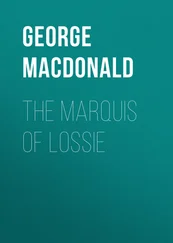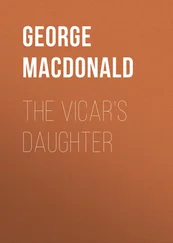George MacDonald - The Elect Lady
Здесь есть возможность читать онлайн «George MacDonald - The Elect Lady» — ознакомительный отрывок электронной книги совершенно бесплатно, а после прочтения отрывка купить полную версию. В некоторых случаях можно слушать аудио, скачать через торрент в формате fb2 и присутствует краткое содержание. Жанр: foreign_prose, foreign_religion, literature_19, foreign_antique, на английском языке. Описание произведения, (предисловие) а так же отзывы посетителей доступны на портале библиотеки ЛибКат.
- Название:The Elect Lady
- Автор:
- Жанр:
- Год:неизвестен
- ISBN:нет данных
- Рейтинг книги:5 / 5. Голосов: 1
-
Избранное:Добавить в избранное
- Отзывы:
-
Ваша оценка:
- 100
- 1
- 2
- 3
- 4
- 5
The Elect Lady: краткое содержание, описание и аннотация
Предлагаем к чтению аннотацию, описание, краткое содержание или предисловие (зависит от того, что написал сам автор книги «The Elect Lady»). Если вы не нашли необходимую информацию о книге — напишите в комментариях, мы постараемся отыскать её.
The Elect Lady — читать онлайн ознакомительный отрывок
Ниже представлен текст книги, разбитый по страницам. Система сохранения места последней прочитанной страницы, позволяет с удобством читать онлайн бесплатно книгу «The Elect Lady», без необходимости каждый раз заново искать на чём Вы остановились. Поставьте закладку, и сможете в любой момент перейти на страницу, на которой закончили чтение.
Интервал:
Закладка:
“Whatever you may think of Mr. Smith’s doctrines, it is presumptuous to set yourself up as too good to go to church.”
“I most bear the reproach, ma’am. I can not consent to be a hypocrite in order to avoid being called one!”
Either Miss Fordyce had no answer to this, or did not choose to give any. She was not troubled that Andrew would not go to church, but offended at the unhesitating decision with which he set her counsel aside. Andrew made her a respectful bow, turned away, put on his bonnet, which he had held in his hand all the time, and passed through the garden gate.
“Who is the fellow?” asked George, partaking sympathetically of his companion’s annoyance.
“He is Andrew Ingram, the son of a small farmer, one of my father’s tenants. He and his brother work with their father on the farm. They are quite respectable people. Andrew is conceited, but has his good points. He imagines himself a poet, and indeed his work has merit. The worst of him is that he sets up for being better than other people.”
“Not an unusual fault with the self-educated!”
“He does go on educating himself, I believe, but he had a good start to begin with. My father took much pains with him at school. He helped to carry you here after the accident—and would have taken you to his father’s if I would have let him.”
George cast on her a look of gratitude.
“Thank you for keeping me,” he said. “But I wish I had taken some notice of his kindness!”
CHAPTER X. ANDREW INGRAM
Of the persons in my narrative, Andrew Ingram is the simplest, therefore the hardest to be understood by an ordinary reader. I must take up his history from a certain point in his childhood.
One summer evening, he and his brother Sandy were playing together on a knoll in one of their father’s fields. Andrew was ten years old, and Sandy a year younger. The two quarreled, and the spirit of ancestral borderers waking in them, they fell to blows. The younger was the stronger for his years, and they were punching each other with relentless vigor, when suddenly they heard a voice, and stopping their fight, saw before them an humble-looking man with a pack on his back. He was a peddler known in the neighborhood, and noted for his honesty and his silence, but the boys had never seen him. They stood abashed before him, dazed with the blows they had received, and not a little ashamed; for they were well brought up, their mother being an honest disciplinarian, and their father never interfering with what she judged right. The sun was near the setting, and shone with level rays full on the peddler; but when they thought of him afterward, they seemed to remember more light in his face than that of the sun. Their conscience bore him witness, and his look awed them. Involuntarily they turned from him, seeking refuge with each other: his eyes shone so! they said; but immediately they turned to him again.
Sandy knew the pictures in the “Pilgrim’s Progress,” and Andrew had read it through more than once: when they saw the man had a book in his hand, open, and heard him, standing there in the sun, begin to read from it, they thought it must be Christian, waiting for Evangelist to come to him. It is impossible to say how much is fact and how much imagination in what children recollect; the one must almost always supplement the other; but they were quite sure that the words he read were these: “And lo, I am with you always, even to the end of the world!” The next thing they remembered was their walking slowly down the hill in the red light, and all at once waking up to the fact that the man was gone, they did not know when or where. But their arms were round each other’s necks, and they were full of a strange awe. Then Andrew saw something red on Sandy’s face.
“Eh, Sandy!” he cried, “it’s bluid!” and burst into tears.
It was his own blood, not Sandy’s!—the discovery of which fact relieved Andrew, and did not so greatly discompose Sandy, who was less sensitive.
They began at length to speculate on what had happened. One thing was clear: it was because they were fighting that the man had come; but it was not so clear who the man was. He could not be Christian, because Christian went over the river! Andrew suggested it might have been Evangelist, for he seemed to be always about. Sandy added, as his contribution to the idea, that he might have picked up Christian’s bundle and been carrying it home to his wife. They came, however, to the conclusion, by no ratiocination, I think, but by a conviction which the idea itself brought with it, that the stranger was the Lord himself, and that the pack on His back was their sins, which He was carrying away to throw out of the world.
“Eh, wasna it fearfu’ He should come by jist when we was fechtin’!” said Sandy.
“Eh, na! it was a fine thing that! We micht hae been at it yet! But we winna noo!—will we ever, Sandy?”
“Na, that we winna!”
“For,” continued Andrew, “He said ‘Lo, I am with you always!’ And suppose He werena, we daurna be that ahint His back we would na be afore His face!”
“Do you railly think it was Him, Andrew?”
“Weel,” replied Andrew, “gien the deevil be goin’ aboot like a roarin’ lion, seekin’ whom he may devoor, as father says, it’s no likely He would na be goin’ aboot as weel, seekin’ to haud him aff o’ ‘s!”
“Ay!” said Sandy.
“And noo,” said the elder, “what are we to do?”
For Andrew, whom both father and mother judged the dreamiest of mortals, was in reality the most practical being in the whole parish—so practical that by and by people mocked him for a poet and a heretic, because he did the things which they said they believed. Most unpractical must every man appear who genuinely believes in the things that are unseen. The man called practical by the men of this world is he who busies himself building his house on the sand, while he does not even bespeak a lodging in the inevitable beyond.
“What are we to do?” said Andrew. “If the Lord is going about like that, looking after us, we’ve surely got something to do looking after Him! ”
There was no help in Sandy; and it was well that, with the reticence of children, neither thought of laying the case before their parents; the traditions of the elders would have ill agreed with the doctrine they were now under! Suddenly it came into Andrew’s mind that the book they read at worship to which he had never listened, told all about Jesus.
He began at the beginning, and grew so interested in the stories that he forgot why he had begun to read it One day, however, as he was telling Sandy about Jacob—“What a shame!” said Sandy; and Andrew’s mind suddenly opened to the fact that he had got nothing yet out of the book. He threw it from him, echoing Sandy’s words, “What’s a shame!”—not of Jacob’s behavior, but of the Bible’s, which had all this time told them nothing about the man that was going up and down the world, gathering up their sins, and carrying them away in His pack! But it dawned upon him that it was the New Testament that told about Jesus Christ, and they turned to that. Here also I say it was well they asked no advice, for they would probably have been directed to the Epistle to the Romans, with explanations yet more foreign to the heart of Paul than false to his Greek. They began to read the story of Jesus as told by his friend Matthew, and when they had ended it, went on to the gospel according to Mark. But they had not read far when Sandy cried out:
“Eh, Andrew, it’s a’ the same thing ower again!”
“No a’thegither,” answered Andrew. “We’ll gang on, and see!”
Andrew came to the conclusion that it was so far the same that he would rather go back and read the other again, for the sake of some particular things he wanted to make sure about So the second time they read St. Matthew, and came to these words:
Читать дальшеИнтервал:
Закладка:
Похожие книги на «The Elect Lady»
Представляем Вашему вниманию похожие книги на «The Elect Lady» списком для выбора. Мы отобрали схожую по названию и смыслу литературу в надежде предоставить читателям больше вариантов отыскать новые, интересные, ещё непрочитанные произведения.
Обсуждение, отзывы о книге «The Elect Lady» и просто собственные мнения читателей. Оставьте ваши комментарии, напишите, что Вы думаете о произведении, его смысле или главных героях. Укажите что конкретно понравилось, а что нет, и почему Вы так считаете.












